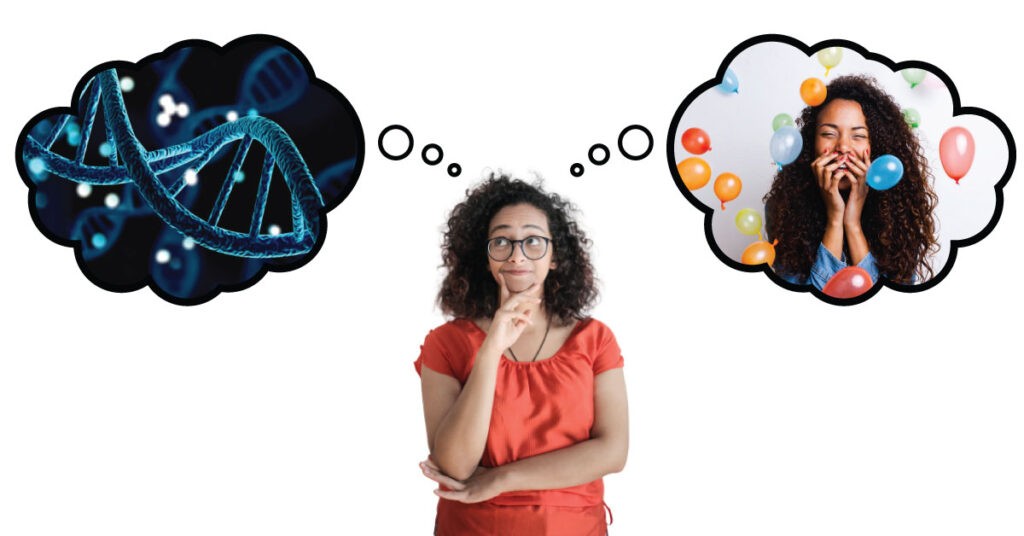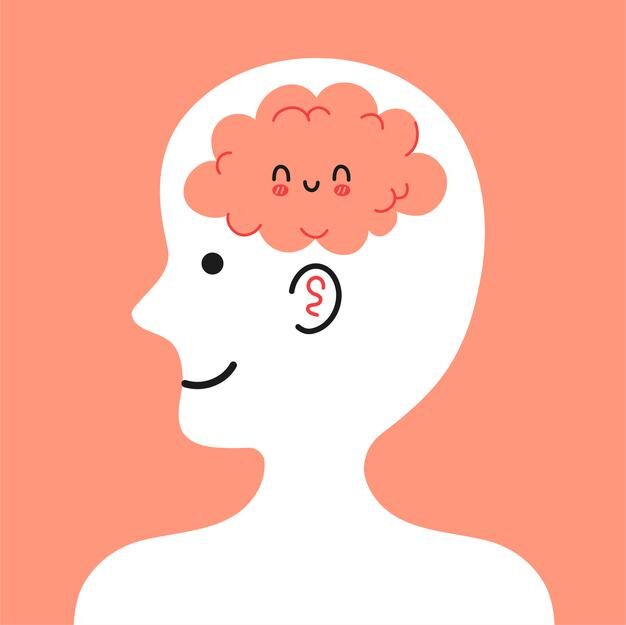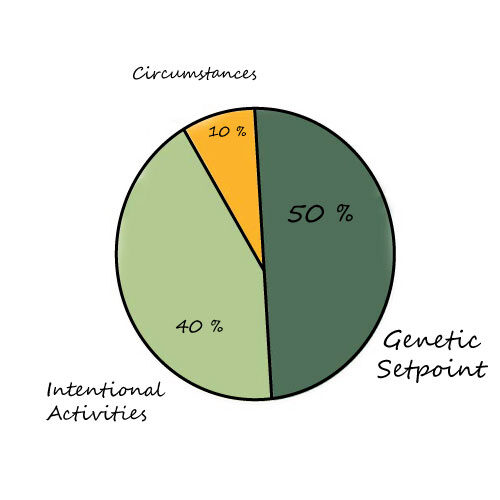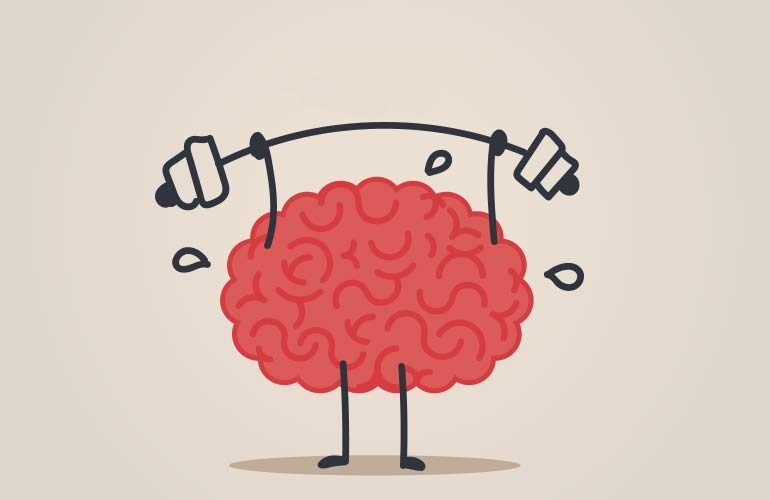
One of the most common reasons I hear as an objection to Optimal Happiness is that happiness is biological and so we can’t do much about it. This assumption would be correct if, for example, happiness was 50 to 80 percent determined by our genes, as some studies claim it to be. Yet, a series of more recent studies contradict this “happiness is biological” hypothesis, stating that these studies are incorrect due to the way data was collected or how it was interpreted.
Actually, we can’t say for certain to what degree our happiness is biological, while we can look at things like our genes, hormones, and overall health to determine our well-being. So yes, we don’t choose the family we are born into and the genes we inherit, but we can do something about our (un)happiness regardless of what cards we were dealt in the biological lottery. Still, in the interest of this article, we will review the myth and science behind the “happiness is biological” statement and see to what extent it is (in)correct.
Origins of The Myth That Happiness is Biological
By default, we don’t want to feel unhappy, and if ever we are unhappy, we want to do something about it. As such, most people try to do many different things to feel happy, like acquiring more money, cars, or a good marriage, but ultimately most fail to be optimally happy (hence the existence of this blog). Others just give up saying that happiness is impossible or find some excuse to justify their unhappiness, such as that happiness is biological (see an other reason for unhappy here).
But there are people with really bad genes, like Nick Vujicic, who was born without hands and legs, or Stephen Hawking, who was diagnosed with motor neuron disease that gradually paralysed his body. Yet, they both declared they will be happy regardless of their unfavorable and difficult life circumstances, with Vujicic being a happiness coach of his own right. And since they both feel happy despite their unfavorable genes, we can do the same. Additionally, there are some studies unrelated to happiness that prove the link between biology and other important parts of our lives, such as health. For example, one study suggests that approximately 39,5% of men and women will be diagnosed with cancer at some point in their lives. I know, it’s a very high number! As such, if this is true for cancer, this must be true for happiness. Except that it is not, and at least it is not clear how much of our biological makeup affects our happiness.

100% of Our Happiness is Biological: Because We Are All Flesh & Blood
As you may know, in university, I studied marketing and not psychology. This perspective allowed me to write my book called Optimal Happiness, but it also created some doubt in my mind about whether I missed something important they teach in these psychology courses. As such, I went back and reviewed psychology curriculums, where I found a course called “the biology of psychology.” In this course, students learn how different parts of the human body, such as their legs, arms, nails, and color of hair or eyes, affect human psychology. This course made me realize that everything, from the way our bodies work to the way the world works, shapes the way we think and feel. Yet, there is a reason why the field of psychology is different from the field of biology, since biology doesn’t answer some of the most fundamental questions in the field of psychology, like how to cure depression.
As such, we could generally conclude that since we are made of flesh and so blood, we are 100% at the mercy of our biology. However, this does not automatically mean that there is something concrete in our biological makeup, such as our genes, that differentiates the happy from the unhappy people. This means that we can’t just say “I am made out of meat and therefore 100% of my psychology and happiness can be predicted by our biology,” which is why we need to look for evidence of “happiness is biological” elsewhere.
80% of Our Happiness is Biological: Heritability Study
One of the first articles on whether happiness is biological or not was a 1997 study that concluded that happiness is 80% biological [1]. This conclusion became very popular with the media, which quickly published these findings, stating to everyone that science finally proved that happiness is outside of our control and that we can’t really do anything about it. This was the confirmation many people wanted to hear to justify the unhappiness they felt in their lives, avoiding taking any responsibility for it. It didn’t matter that the logic didn’t add up. After all, Aristotle stated that everything we do is for the sake of happiness. Thus, despite spending virtually all the time, energy, and money pursuing positive emotions or avoiding the negative ones, this article stated that we can’t do much about the cards we were dealt. As such, indirectly, this study suggests that we might as well give up on trying to feel happy, since it does not matter what we do, as it will have little to no effect on our overall emotional well-being.
It didn’t take long for the scientific community to refute the evidence of this study. After all, what this study actually measured was the heritability of the genes and not their effect on our overall happiness. In other words, the study was measuring the chance of passing certain genes from one generation to the next, regardless of what genes they were talking about. However, this does not mean that if your grandpa had a bad temper, that you are likely to be the same way, since despite your similar genes, your lives will be quite different.
Still, the damage was done. It didn’t matter that this study was ultimately misleading. It was one of the first, one-sided, and most promoted conclusions in the media, which is why it was quickly picked up and accepted by the masses. As such, people from all over the world quickly believed this misinformation, directly or indirectly spreading it up to a point that we directly or indirectly believe in it to this day.

50% of Our Happiness is Biological: And The Pie Chart of Happiness
A more realistic prediction regarding our biological happiness comes from a 2005 research conducted by researchers Sonja Lyubomirsky, Kennon Sheldon, and David Schkade [2]. They concluded that our happiness is 50% genetically inheritable, 10% attributing to environmental factors, such as our age and gender, and the last 40% to the way we lead our lives. This conclusion was once again interesting, accepted, and highly promoted to the public because it provided an easy and intuitive way to look into the topic of happiness and divided it into meaningful chunks. It also stated that we are 40% in control of our overall happiness, which means that it does matter how we lead our lives.
However, once again, peer review articles challenged the validity of these findings. For example, this article is still talking about the inheritability of happiness. Moreover, we can’t clearly divide our happiness into exact percentages, as people’s lives differ significantly from person to person.
Finally, Sheldon and Lyubomirsky updated their paper admitting that they agree with criticisms and that their research did not clarify how different factors such as genes, actions, and experiences interact with each other.
3 Genetic Markers of Happiness
Originally, when Nobel Prize-winning physicist Leon Lederman found The God Particle, he called it the “Godd*mn Particle,” because it was “Godd*mn hard to find”. It was later renamed into “The God Particle” by his editor, who felt that the new name would be more reader friendly. The name stuck, but God had nothing to do with this whole story.
Similarly, at Vrije Amsterdam University, professors Meike Bartels and Phillip Koellinger conducted a large-scale international study of over 298,000 people and found 3 genetic variations, which are related to our sense of happiness [3]. Later, they admitted that this task was impossibly hard, as they indeed needed almost 300.000 participants to find these 3 genetic markers. However, it is still not clear how this research will be applied in real life. Indeed, it is a relatively difficult task to look at the genetic code of people and once we find these genes mapped in a certain way, it is still not definitive that people will feel things in a specific way. Most likely, these markers guide our happiness, but they don’t cause it, meaning that we still have a lot to say about our sense of happiness overall.

The Four Happiness and Unhappiness Hormones
Scientific literature has long ago found the four hormones of happiness, which are dopamine, oxytocin, serotonin, and endorphins. They have also found the four unhappiness hormones, which are cortisol, corticotropin-releasing hormone (CRH), catecholamines, and thyroid hormone. However, without going too much into details in terms of what each hormone does, as it would be a separate article in itself, we can definitely conclude that these hormones are produced in our bodies as a result of happiness and unhappiness, and are indirectly correlated to our biological makeup. In other words, while we can measure these hormones and conclude whether a person is happy or unhappy in a given moment of time, we can’t measure them and overall conclude whether we have an optimist or a pessimist, and even less so measure if happiness or unhappiness is related to our biological makeup.
Right And Left Brain Predicting Your Happiness
In the 1980s, famous happiness researcher Richard Davidson conducted a study concluding that people with the left side of their brain as more dominant are less subject to depression and quicker to recover from negative experiences, compared, obviously, to their predominantly right-brained counterparts [4]. The dominant part of the brain matters, as it will affect your overall susceptibility to stress, depression, and other negative emotions. As such, Jonathan Haidt calls it “winning the genetic lottery”, as you are luckier, at least for the sake of happiness, if you were born with the left dominant side of the brain.
However, even if you have a dominant right side of the brain and you are more susceptible to negativity, we are still talking about your predisposition, not an obligation, to be negative for life. To this degree, even left-side dominant people are not free from negativity and predominantly right-side dominant people can learn to protect themselves from stress. Moreover, this study does not say to what degree people will become positive or negative because of this predisposition, unlike the conclusion of the 50-80% studies.

Neuroplasticity
Lastly, until now we assumed that we are at the mercy of our genes, but is it really so? After all, a recent discovery of neuroplasticity challenged the way we view our brain, from a predominantly fixed state to a brain that can rewire itself on a cellular level [5]. In other words, we are not at mercy of our biology and we can even influence it with the right tools. As such, no one is an optimist or a pessimist for life and we can change the way we feel by doing certain exercises and following certain guidelines. Ultimately, this challenges the whole thesis that happiness is biological, stating that we are much more in control over how we feel, in turn removing this possible excuse for why we feel unhappy.
Conclusion: We Should Still Try To Be Happy
Overall, today we may believe that happiness is biological, or at least partially so, due to misleading science and media hype that surround these findings. So can we predict our happiness by looking at our biology? We are not sure, as there are many findings, but no one can clearly state how they affect our psychological state overall.
Still, even if we disregard for a moment all this evidence and imagine that happiness is 80% biological. On one hand, this is bad news since most of our happiness is out of our control, but on the other hand, we are still in control of 20%, which is still a lot! As such, regardless of how much our biology actually affects our happiness, we should not just throw our hands in the air in defeat, since we know for a fact that what we do in our lives affects our happiness in a positive or negative way.
So what if happiness is, for the most part, biological? Optimists look at the part of the glass half full, while pessimists look at the part half-empty, and we should take the side of the optimists on this one. We have more than enough control over our emotional well-being, as we know that certain correct actions will lead to positive results, increasing our well-being. After all, happiness is one of the most important skills in life, if not the most important skill, as stated by Aristotle. We should treat it as such, by taking whatever control we can, optimizing it, and aiming at Optimal Happiness.
Source:
1- Lykken, D., and Tellegen, A. (1996). Happiness is a stochastic phenomenon. Psychological Science, 7, 186-189.
2- Lyubomirsky, S., Sheldon, K. M., and Schkade, D. (2005). Pursuing Happiness: The Architecture of Sustainable Change. Review of General Psychology, 9 (2), 111-131.
3- Okbay, A., et al. (2016). Genetic variants associated with subjective well-being, depressive symptoms, and neuroticism identified through genome-wide analyses. Nature Genetics.
4- Wheeler, R. E., Davidson, R. J. and Tomarken, A. J. (1993). Frontal brain asymmetry and emotional reactivity: A biological substrate of affective style. Psychophysiology, 30: 82-89.
5- The Body Keeps the Score: Brain, Mind, and Body in the Healing of Trauma by Bessel van der Kolk M.D.















3 thoughts on “Happiness is Biological? Why Genes Don’t Predict Happiness”
Very interesting information!Perfect just what I was looking for! “The whole point of getting things done is knowing what to leave undone.” by Lady Reading.
Pingback: 5 Common Misconceptions About Happiness Coaches
Pingback: Anti-Happiness Culture And People Who Promote Unhappiness